News & Events
August 31, 2018
Eighty Participate in AIHEC Institute and TCU Data Conference at the UW
By Leo N. Egashira
Sixty participants from around the country, plus twenty University of Washington-affiliated people endured the first heat wave of the summer and took part in the productive “American Indian Higher Education Consortium (AIHEC) Behavioral Health Research Institute and the Indigenous Wellness Research Institute (IWRI) Tribal Colleges and Universities (TCU) Data Conference,” June 18-21, 2018, at the University of Washington.
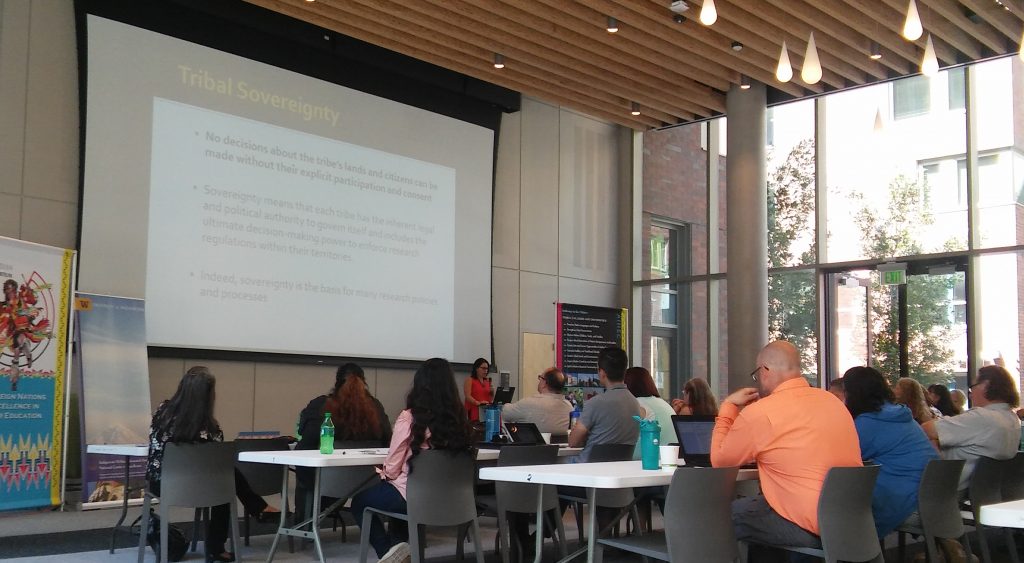
A plenary session held at UW’s Maple Hall
The invited participants—the vast majority from 18 TCUs from around the country—represented three programmatic tracks:
- AIHEC “NARCH” (NIH’s Native American Research Centers for Health) grantee teams composed of students and researchers,
- TCU personnel and researchers in AIHEC’s Indigenous behavioral health research certificate program, and
- Counselors and liaisons involved with three TCU research studies that were conducted by the UW.
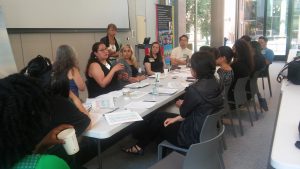
A small group discussion
There were also officers and representatives from AIHEC, the National Institutes of Health, the University of Minnesota, the University of New Mexico, Washington State University, and Seattle’s Veterans Administration Hospital.
Hosts and emcees for the 3½-day event were AIHEC NARCH Director Deborah His Horse Is Thunder, EdD, and the Principal Investigator for the UW TCU research studies, Bonnie Duran, DrPH. The Keynote speech, “Indigenous Research through an Indigenous Worldview,” was given by Sweeney Windchief, PhD, assistant professor at Montana State University. Other major presenters were Kathy Etz, PhD, National Institute of Drug Abuse, and Roberto A. Delgado, Jr., PhD, National Institute of Mental Health, who both engaged the audience with a timely and useful topic, “Grant Writing to Further Research Opportunities.”
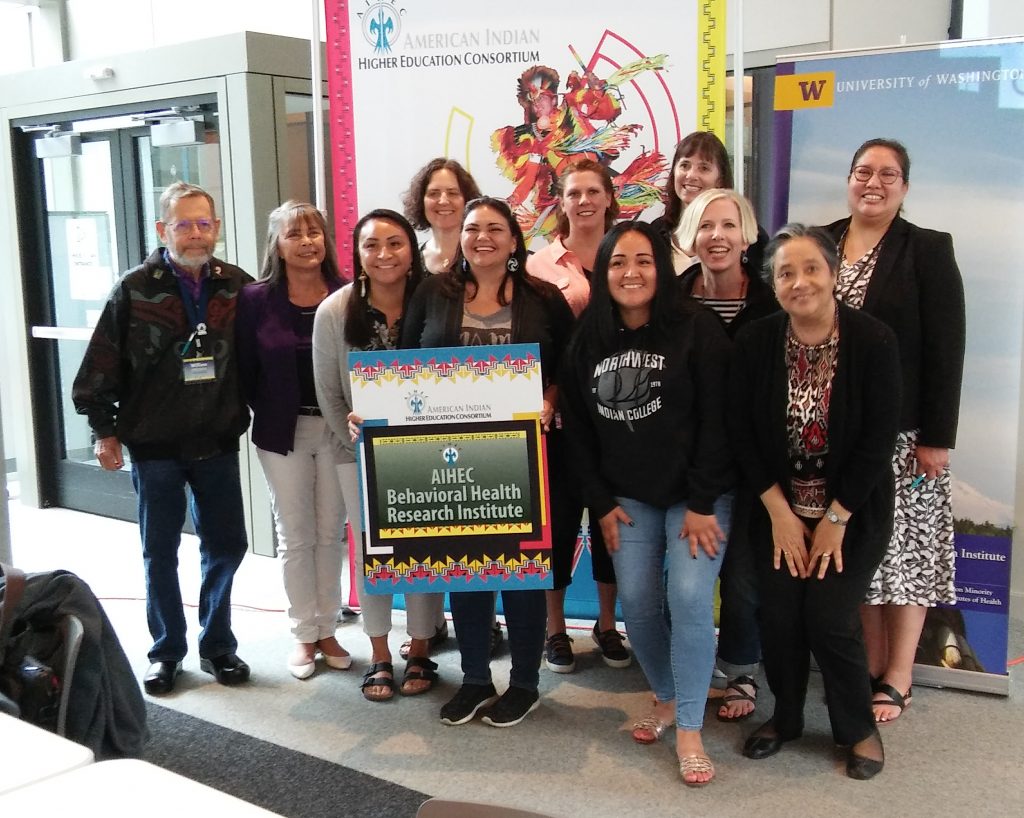
The Behavioral Health Research Institute cohort
Perhaps one of the most important outcomes of the Institute and Conference were the insights and contextualization that participants shared during small group discussions where UW researchers presented 15 draft manuscripts. These manuscripts were based on analysis from the TCU Student Epidemiology Survey and the TCU “Brief Alcohol Screening & Intervention for College Students” Adaptation Study, both conducted by the UW.
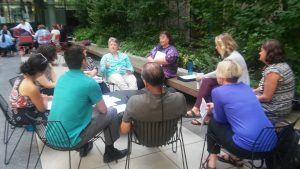
A small group discussion held outside
Amidst full days of engagement and discussions, participants also were able to enjoy a Pacific Northwest salmon dinner at the Native-inspired and -run “Intellectual House” on the UW campus, and a visit to sacred Snoqualmie Falls in the green and verdant foothills of the Cascade Range.
At the conclusion of the jointly-sponsored Institute and Conference, participants were unanimous in feeling that the stated goals were met, and that they were better able to:
- Distinguish indigenous research methodology;
- Assess indigenous research methodology as it may apply within communities;
- Define the responsibilities of researchers in indigenous communities;
- Review community-based participatory research implementation within TCUs and their communities;
- Identify major contextual and historical factors significant in the work with TCUs and indigenous communities; and
- Contextualize to the TCU environment draft manuscripts based on the analysis of data from TCU studies conducted by the UW.
While the conference may be over, there is much more work to be done. Participants will continue to be engaged with researchers to ensure that fifteen manuscripts get submitted and published (and 15 more identified topics need to be turned into manuscripts); preparing for the next cohort of the indigenous behavioral health certificate program, and continued work on the AIHEC NARCH projects.
Institute and Conference acknowledgments:
- AIHEC 2013 NARCH 7 Project, Grant Number: U2611HS0083-05-00, funded by the Department of Health and Human Services-Indian Health Services
- National Institute on Minority Health and Health Disparities, Grant Number: R13MD012440
[Conference organizers would like the thank UW Conference Services in providing accommodations, meals, and venue.]
University of Washington TCU Studies acknowledgments:
- TCU Drugs and Alcohol Problems and Solutions Study: Funded by the National Institute on Drug Abuse through the Indian Health Service’s NARCH program, Grant Number: 1R01DA029001
- TCU Student Epidemiology Survey: Funded by the National Institute on Minority Health and Health Disparities, Grant Number: 5P60MD006909
- TCU Brief Alcohol Screening and Intervention for College Students: Funded by the National Institute of Alcohol and Alcohol Abuse, Grant Number: 1R01AA022068
[The UW TCU Research Team would like to thank all the partners and collaborators for the three studies listed above: AIHEC, participating TCUs, and UW institutes—Indigenous Wellness Research Institute, Center for the Studies of Health Risk Behaviors, Alcohol and Drug Abuse Institute.]
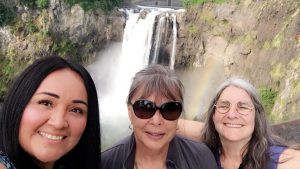
At Snoqualmie Falls; (center) co-host Deborah His Horse Is Thunder
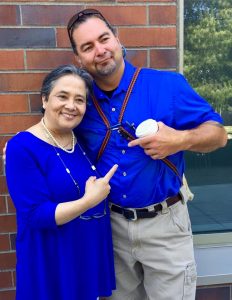
Co-host Bonnie Duran with Keynote Speaker, Sweeney Windchief
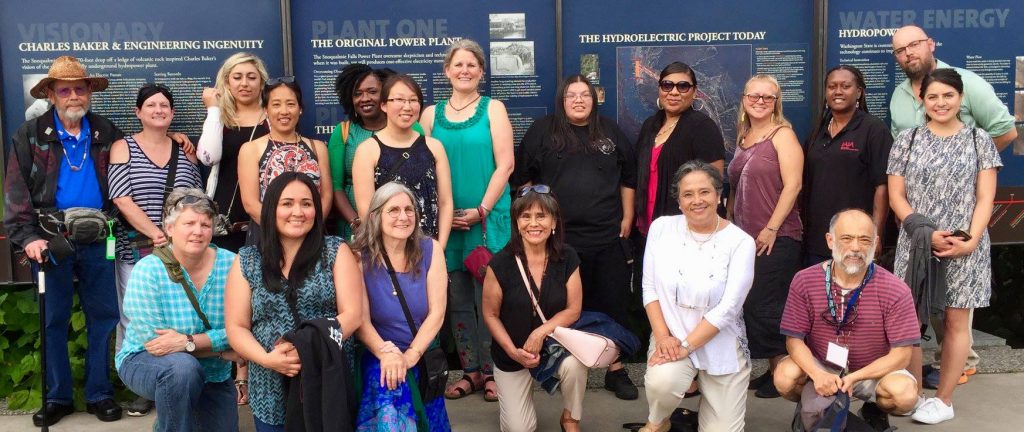
Part of the group at Snoqualmie Falls




